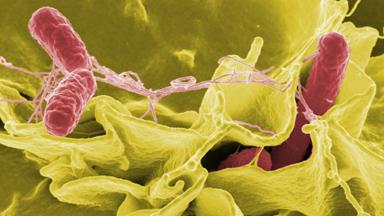New study shows how Salmonella colonises the gut
Researchers plan to use data collected to develop vaccines to control Salmonella in animals and humans

Salmonella is a major cause of human diarrhoeal infections and is frequently acquired from chickens, pigs and cattle, or their products. Around 94 million such infections occur in people worldwide each year, with approximately 50,000 cases in the UK per annum.
In a BBSRC-funded collaboration between the University of Cambridge's Department of Veterinary Medicine, the University of Edinburgh's Roslin Institute and the Wellcome Trust Sanger Institute, scientists have studied how Salmonella colonises the intestines of food-producing animals. This is relevant both to the welfare of the animal hosts and to contamination of the food chain and farm environment.
To unravel how Salmonella persists in farm animals, the scientists studied the role of thousands of its genes. Using a novel DNA-sequencing method the team screened 10,000 mutants of Salmonella for their ability to colonise the guts of chickens, pigs and cattle. This was achieved by using a novel technique based on high-throughput DNA sequencing which enabled the screening of 475 mutants of the bacteria per single animal. In the process, they assigned roles in infection to over 2700 Salmonella genes in each of the farm animal hosts. This has yielded roles for over half the genetic instructions of the bacterium and is by far the most comprehensive survey for any pathogen in its natural hosts to date.
We found that hundreds of genes are important for colonisation; this provides vital new data for the design of strategies to control Salmonella in animals and reduce transmission to humans. Our data indicate that Salmonella contains a core set of genes that is important when it infects all three hosts, but that there are smaller sets of genes that are required for infection of each individual host species.
We are always trying to develop new ways of reducing the number of animals used in experiments. The methods we applied allowed us to survey the fate of hundreds of bacterial mutants simultaneously in one animal, rather than us having to test them one-by-one. This represents a significant advance in the study of microbial diseases, and can be applied to other pathogens and host animals.
The team now plans to use the data it has collected to design vaccines or treatments to reduce the burden of salmonellosis in animals and humans.
The study was published today in the journal PLoS Genetics.
For more information please contact:
Genevieve Maul
Office of Communications
- University of Cambridge
Contact details


